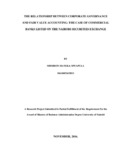| dc.contributor.author | Mwapula, Shimron M | |
| dc.date.accessioned | 2017-01-09T07:33:16Z | |
| dc.date.available | 2017-01-09T07:33:16Z | |
| dc.date.issued | 2016 | |
| dc.identifier.uri | http://hdl.handle.net/11295/99812 | |
| dc.description.abstract | The world has awakened to the concerns of poor performance and eventual collapse of large corporations. This has led to calls for need to strengthen corporate governance. The waves of collapse and financial turmoil of large corporations many of which are in the financial sector, has elicited public interest both locally and internationally. Credit crisis was attributed to some extent on the use of fair value accounting which provided for opportunistic reporting on financial operations. Corporate governance is key in safeguarding shareholder interests which borders on prudent financial reporting. The study sought to determine whether a relationship exist between corporate governance and fair value adjustment in the case of commercial banks in Kenya. While determining the relationship the study focused on the use of level 2 and 3 inputs in estimating the designated value of financial assets and liabilities. The board being the apex organ in corporate governance was the focus of the study in estimating the values by use of level 2 and 3 inputs. The study took a census approach on 11 commercial banks listed on the NSE for period 2011 to 2015. The study design used a deductive approach while data analysis was on regression and correlation analysis to achieve research objective. Analyzed data was collected from annual financial reports got from the respective bank websites. The multiple linear regression model’s coefficient of correlation (R) is 0.317 and coefficient of determination (R2) is 0.008 implying that 31.7% of net financial assets designated at level 2 and 3 hierarchy is explained by the model’s independent variables while 68.3% is explained by the error term and other independent variables. The study results do show the existence of positive relationship between net financial assets designated at level 2 and 3 fair values and board independence and external auditor independence. The negative relationship established by the study model and supported by both regression and correlation analysis related to board share ownership and board compensation. Board level of education was found to have a positive coefficient in regression model but with a positive correlation of .101 at sig .465. Results of this study also highlight that board’s level of education, board compensation, board independence and external auditor independence are key in any attempt for opportunistic reporting on net financial assets designated at level 2 and 3 fair values. The results of this study will contribute to the debate on the opportunistic use of fair value accounting in a global context and seek to answer questions on the detriments of use of fair value accounting in modern day if any. | en_US |
| dc.language.iso | en | en_US |
| dc.publisher | University Of Nairobi | en_US |
| dc.rights | Attribution-NonCommercial-NoDerivs 3.0 United States | * |
| dc.rights.uri | http://creativecommons.org/licenses/by-nc-nd/3.0/us/ | * |
| dc.subject | Corporate Governance And Fair Value Accounting | en_US |
| dc.title | The Relationship Between Corporate Governance and Fair Value Accounting: the Case of Commercial Banks Listed on the Nairobi Securities Exchange | en_US |
| dc.type | Thesis | en_US |



